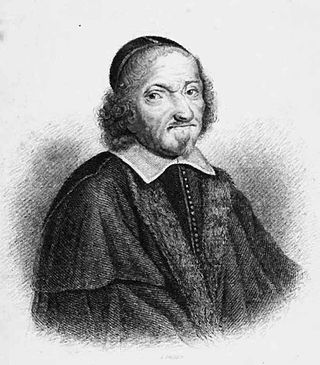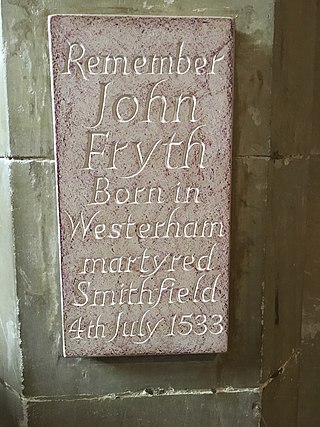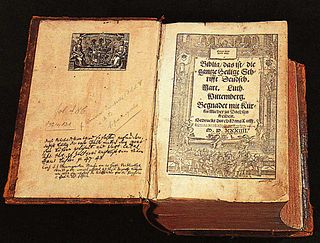The Reformation, also known as the Protestant Reformation, was the 16th century schism within Western Christianity initiated by Martin Luther, John Calvin, and others

Sir Thomas More, venerated in the Catholic Church as Saint Thomas More, was an English lawyer, judge, social philosopher, author, statesman, amateur theologian, and noted Renaissance humanist. He also served Henry VIII as Lord High Chancellor of England from October 1529 to May 1532. He wrote Utopia, published in 1516, which describes the political system of an imaginary island state.

William Tyndale was an English Biblical scholar and linguist who became a leading figure in the Protestant Reformation in the years leading up to his execution. He is well known as a translator of much of the Bible into English, and was influenced by the works of prominent Protestant Reformers such as Martin Luther.

Myles Coverdale, first name also spelt Miles, was an English ecclesiastical reformer chiefly known as a Bible translator, preacher and, briefly, Bishop of Exeter (1551–1553). In 1535, Coverdale produced the first complete printed translation of the Bible into English. His theological development is a paradigm of the progress of the English Reformation from 1530 to 1552. By the time of his death, he had transitioned into an early Puritan, affiliated to Calvin, yet still advocating the teachings of Augustine.

The Matthew Bible, also known as Matthew's Version, was first published in 1537 by John Rogers, under the pseudonym "Thomas Matthew". It combined the New Testament of William Tyndale, and as much of the Old Testament as he had been able to translate before being captured and put to death. Myles Coverdale translated chiefly from German and Latin sources and completed the Old Testament and Biblical apocrypha, except for the Prayer of Manasseh, which was Rogers', into the Coverdale Bible. It is thus a vital link in the main sequence of English Bible translations.

The Great Bible of 1539 was the first authorised edition of the Bible in English, authorised by King Henry VIII of England to be read aloud in the church services of the Church of England. The Great Bible was prepared by Myles Coverdale, working under commission of Thomas Cromwell, Secretary to Henry VIII and Vicar General. In 1538, Cromwell directed the clergy to provide "one book of the Bible of the largest volume in English, and the same set up in some convenient place within the said church that ye have care of, whereas your parishioners may most commodiously resort to the same and read it."
Early Modern English Bible translations are those translations of the Bible which were made between about 1500 and 1800, the period of Early Modern English. This was the first major period of Bible translation into the English language including the King James Version and Douai Bibles. The Reformation and Counter-Reformation led to the need for Bibles in the vernacular with competing groups each producing their own versions.

John Frith was an English Protestant priest, writer, and martyr.

The English Renaissance was a cultural and artistic movement in England during the late 15th, 16th and early 17th centuries. It is associated with the pan-European Renaissance that is usually regarded as beginning in Italy in the late 14th century. As in most of the rest of Northern Europe, England saw little of these developments until more than a century later within the Northern Renaissance. Renaissance style and ideas were slow to penetrate England, and the Elizabethan era in the second half of the 16th century is usually regarded as the height of the English Renaissance. Many scholars see its beginnings in the early 16th century during the reign of Henry VIII. Others argue the Renaissance was already present in England in the late 15th century.
In Christian eschatology, historicism is a method of interpretation of biblical prophecies which associates symbols with historical persons, nations or events. The main primary texts of interest to Christian historicists include apocalyptic literature, such as the Book of Daniel and the Book of Revelation. It sees the prophecies of Daniel as being fulfilled throughout history, extending from the past through the present to the future. It is sometimes called the continuous historical view. Commentators have also applied historicist methods to ancient Jewish history, to the Roman Empire, to Islam, to the Papacy, to the Modern era, and to the end time.

The Coverdale Bible, compiled by Myles Coverdale and published in 1535, was the first complete Modern English translation of the Bible, and the first complete printed translation into English. The later editions published in 1537 were the first complete Bibles printed in England. The 1537 folio edition carried the royal licence and was therefore the first officially approved Bible translation in English. The Psalter from the Coverdale Bible was included in the Great Bible of 1540 and the Anglican Book of Common Prayer beginning in 1662, and in all editions of the U.S. Episcopal Church Book of Common Prayer until 1979.

Tyndale House is an independent biblical studies library in Cambridge, England, with a Christian foundation. Founded in 1945, it aims to provide specialist resources in support of research into the Old and New Testaments, along with relevant historical backgrounds.

The Tyndale Bible (TYN) generally refers to the body of biblical translations by William Tyndale into Early Modern English, made c. 1522–1535. Tyndale's biblical text is credited with being the first Anglophone Biblical translation to work directly from Hebrew and Greek texts, although it relied heavily upon the Latin Vulgate and Luther's German New Testament. Furthermore, it was the first English biblical translation that was mass-produced as a result of new advances in the art of printing.

Jacobus Latomus was a Catholic Flemish theologian, a distinguished member of the Faculty of Theology at the University of Leuven. Latomus was a theological adviser to the Inquisition, and his exchange with William Tyndale is particularly noted. The general focus of his academic work centered on opposing Martin Luther and the Protestant Reformation, supporting the papacy and the hierarchy of the Catholic Church. Etymology: Latinized Latomus = Masson from Greek lā-tómos 'stone-cutter, quarryman', thus 'mason'.
George Joye was a 16th-century Bible translator who produced the first printed translation of several books of the Old Testament into English (1530–1534), as well as the first English Primer (1529).
David John Daniell was an English literary scholar who became Professor of English at University College London. He was founder of the Tyndale Society, a specialist in William Tyndale and his translations of the Bible, and author of a number of studies of the plays of Shakespeare.
Geoffrey William Bromiley was an English ecclesiastical historian and Anglican theologian. He was professor emeritus at Fuller Theological Seminary in Pasadena, California, having been Professor of Church History and Historical Theology there from 1958 until his retirement in 1987.

A Protestant Bible is a Christian Bible whose translation or revision was produced by Protestant Christians. Typically translated into a vernacular language, such Bibles comprise 39 books of the Old Testament and 27 books of the New Testament, for a total of 66 books. Some Protestants use Bibles which also include 14 additional books in a section known as the Apocrypha bringing the total to 80 books. This is in contrast with the 73 books of the Catholic Bible, which includes seven deuterocanonical books as a part of the Old Testament. The division between protocanonical and deuterocanonical books is not accepted by all Protestants who simply view books as being canonical or not and therefore classify books found in the Deuterocanon, along with other books, as part of the Apocrypha. Sometimes the term "Protestant Bible" is simply used as a shorthand for a bible which contains only the 66 books of the Old and New Testaments.
William Maldon was a 16th-century English Protestant activist who taught himself to read in order to directly access the Bible in English. An autobiographical account on Maldon's self-taught literacy and his father's subsequent violent reaction, "A young man inhumanly persecuted by his Father for reading ye scripture, in K. Henries time", appeared in the Actes and Monuments by John Foxe.
Humphrey Monmouth was an English merchant in London who was an acquaintance of Bible translator William Tyndale. Monmouth was a wealthy member of the Drapers' Company and served as an alderman and sheriff of London from 1535 to 1536.










